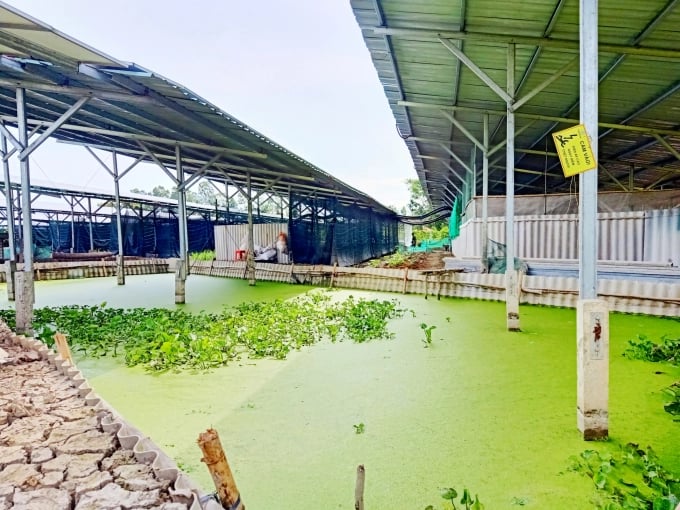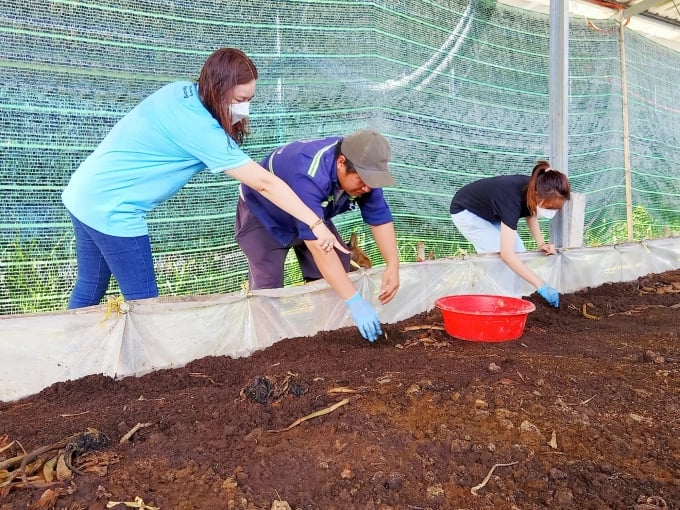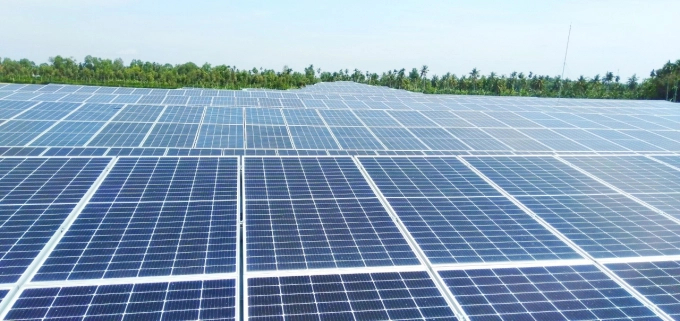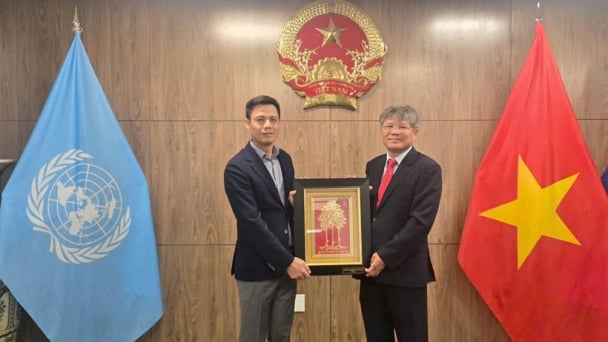May 22, 2025 | 18:05 GMT +7
May 22, 2025 | 18:05 GMT +7
Hotline: 0913.378.918
May 22, 2025 | 18:05 GMT +7
Hotline: 0913.378.918
Covering the area of roughly 8,000-meter squares in Tan Binh commune, Phung Hiep district, Hau Giang province, Ngu Thuong Mekong farm of Ms. Lu Thi Nhat Hang is deemed a closed agricultural farm with systematical investment in the region. To expand the farm, Ms. Nhat Hang invested in a roof voltage system with a capacity of 990kWp, a closed agricultural production chain, creating rooftop voltage and taking advantage of the below space to produce organic agriculture.

Ms. Lu Thi Nhat Hang, Director of Ngu Thuong Mekong Farm, invested more than VND 20 billion in circular agriculture in Phung Hiep district, Hau Giang province. Photo: Kim Anh.
The circular production model starts with the phases of planting and harvesting mushrooms. She revealed that since the beginning of 2021, 10 staw mushroom houses with a combined size of 350-meter squares have been put into production. After being gathered, straw baits are collected and incubated with probiotics to make organic fertilizer for growing king grass, veggies, and feed composting worms. The farm produces 30-35kg of straw mushrooms for harvest daily, making roughly VND 50 million per month.
King grass grows well and becomes a feed source for cows. The waste from cows is reused to feed composting worms, which are subsequently utilized as feed for chickens, ducks, and fish.

A corner of the more than 8,000m2 circulating farm of Ms. Lu Thi Nhat Hang. Photo: Van Vu.
The circulation system not only utilizes discarded products but also decreases waste emitted into the environment. In particular, it also minimizes the labor to operate the farm. Currently, the farm has additionally constructed and put into production 4 composting worm houses with an area of 400-meter squares. Composting worms, in addition to being used on the farm, are also sold commercially for VND 50,000 per kilogram for fresh or frozen kinds.

The composting worm farming model contributes to making the most of the by-products of the cultivation and husbandry industries, creating a source of organic fertilizer for other agricultural industries. Photo: Kim Anh.
Speaking about the circular orientation of the farm, Ms. Lu Thi Nhat Hang, director of Ngu Thuong Mekong Farm, explained that the model is beneficial since it can handle trash fully rather than releasing it into the surrounding region due to its prime location in a residential area. To keep up with the trend of organic agricultural products, animals on the farms are also taken care of with organic products for optimal development and ensuring safety for consumers.
The farm's current supply of fertilizer is completely comprised of recycled organic fertilizers derived from waste by-products. One species' waste will become feed and fertilizer for another species. This all contributes to the formation of a cyclical, closed, rational, and scientific circle. Along with agricultural growth, Ngu Thuong Mekong Farm is now a location for Can Tho University students to study, learn, and become familiar with circular agriculture.
Many farmers are likely unfamiliar with the concept of circular agriculture. Indeed, it is considered simple when discarded and abandoned materials such as agricultural waste products are used to create fertilizer and feed for livestock and crop production. Circular agriculture is distinguished from conventional agriculture by the creation of a safe, qualified product and the reduction of waste to the surrounding environment.

A roof voltage system is invested to create a clean energy source for the production activities of the farm. Photo: Van Vu.
Ngu Thuong Mekong Farm began operating a roof voltage system with a capacity of 4,000 kWh/day in December 2020, with a monthly income exceeding VND 200 million owing to the cooperation of Phung Hiep authorities. Simultaneously, utilizing agricultural by-products as input materials for farming results in safe products lowers waste, and benefits the environment.
With the early results of the model, the farm will continue to develop and promote ecotourism, to increase earnings to VND 1 billion per year in the future.
Mr. Tran Van Tuan, Head of Agriculture and Rural Development Office of Phung Hiep district, Hau Giang province, stated that the circular agriculture model is currently the district's development direction and is being given due attention and direction by the agricultural industry to close and link the inputs and outputs of agricultural products.
Phung Hiep district is developing and guiding its farmers toward safe agriculture, then into organic and closed-loop agriculture. Over the years, the community has developed and extended about 200 integrated models to serve as a foundation for developing a closed circular agricultural production model.
According to Assoc. Prof. Dr. Nguyen Khoi Nghia, Deputy Head of the Department of Soil Science at Can Tho University's Faculty of Agriculture, while the nutritional content of by-products from agriculture, livestock, and aquaculture is quite high, maximizing the nutritional value of these by-products is critical. To be fully utilized, this technique must be carried out in a closed environment on a farm. As a result, generating a new product with economic value while reducing manufacturing input costs.
According to Assoc. Prof. Dr. Nguyen Khoi Nghia, vermicompost is the result of the breakdown of organic matter that composting worms may consume, such as vegetables, fruits, and even kitchen waste. Vermicompost is nutritionally dense, beneficial to plants, and improves the soil. Because this model is on household size, farmers may completely utilize waste by-products in its development, allowing it to be applied to clean agricultural production and organic agriculture.
With the present pressures of escalating agricultural material prices, localities and farmers must aggressively shift their attention to circular, sustainable, and environmentally friendly agriculture to increase profitability.
Vietnam has great potential in the field of organic fertilizers, according to Mr. Hoang Trung, Director of the Plant Protection Department. Agricultural by-products alone have a potential volume of more than 200 million tons. By maximizing the value of this by-product and lowering expenses, we can both contribute to organic and green agriculture and train people to think differently about agricultural production when chemical fertilizers and insecticides are not always essential.
Agriculture in a circular fashion helps the establishment of a closed environment. Circular agriculture operates on a wide range of scales, from household to farm, cooperative, and company. Circular agriculture is progressing in the correct direction, especially in light of today's high pricing. Saving and decreasing expenses is a primary issue for the agriculture industry and farmers. And, more than anybody else, it is farmers who are willing to take risks in learning, changing, and investing that will result in the projected high efficiency.
Translated by Linh Linh
![Reducing emissions from rice fields: [3] New values generated from carbon credit](https://t.ex-cdn.com/nongnghiepmoitruong.vn/608w/files/content/2025/05/19/dsc09613-144700_71-150957.jpg)
(VAN) In addition to helping safeguard the environment, the low-emission rice cultivation model also generates new opportunities for farmers by leveraging the carbon credit market.
![Ho Chi Minh city adapts to climate change: [1] Vulnerable in the whirlwind of development](https://t.ex-cdn.com/nongnghiepmoitruong.vn/608w/files/duyenht92/2025/05/19/3131-ngap-nongnghiep-163121.jpg)
(VAN) As the country's economic engine with a rapid urbanization rate, Ho Chi Minh city is facing increasingly serious consequences of climate change.

(VAN) On May 21, Minister of Agriculture and Environment Do Duc Duy worked with Mr. Olivier Brochet, Ambassador Extraordinary and Plenipotentiary of the French Republic to Vietnam.

(VAN) VRG recently conducted a visit and working trip to the United States to demonstrate its efforts in redefining the role of rubber enterprises in the global value chain.

(VAN) In 2024, over 295 million people across 53 countries and territories faced acute hunger—an increase of almost 14 million people compared to 2023, while the number of people facing catastrophic levels of hunger reached a record high.

(VAN) World Environment Day 2025 (June 5) carries the theme 'Beat Plastic Pollution' continuing to emphasize the global urgency of addressing the plastic waste crisis.

(VAN) This was the assessment shared by experts at the workshop titled 'Assessing the Role and Potential of Low-Emission Rice Production Systems in Vietnam,' held on the morning of May 19.